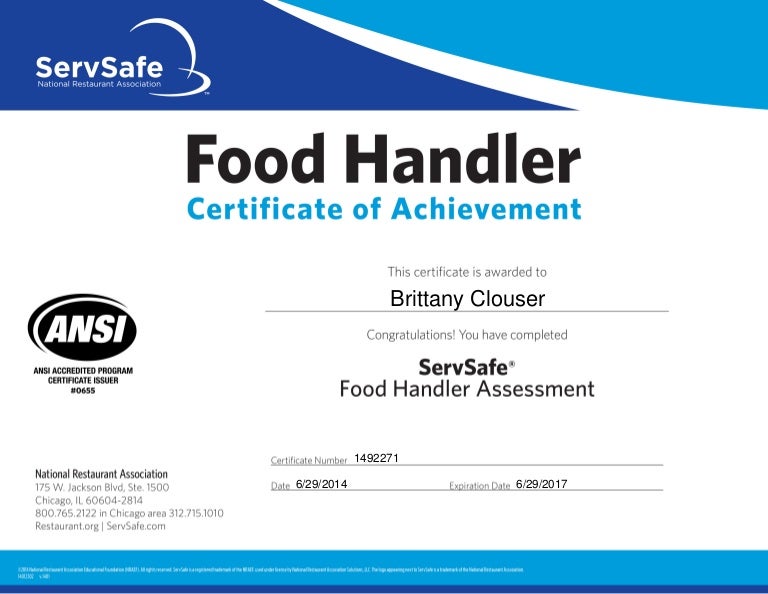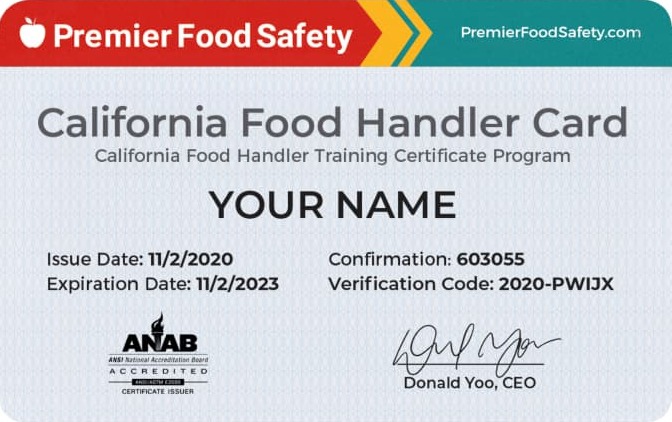Actions to Ending Up Being a Qualified ServSafe Food Handler in Your State
Actions to Ending Up Being a Qualified ServSafe Food Handler in Your State
Blog Article
Get Qualified: Master Food Safety With Food Trainer Certification
The value of getting a Food Trainer Accreditation can not be overstated in today's food solution landscape. This credential not just encourages individuals with necessary knowledge of hygiene and safety and security practices yet also plays a pivotal role in safeguarding public health. As the industry encounters enhancing examination relating to food safety criteria, understanding the accreditation process and its implications ends up being vital. Numerous might continue to be not aware of the extensive advantages that prolong beyond conformity. What opportunities could occur for those who take this important step toward mastery in food safety and security?

Relevance of Food Security Qualification
Food safety certification is crucial for ensuring that food handlers are geared up with the understanding and skills essential to preserve high standards of health and security in cooking and service. This accreditation not just boosts the proficiency of people functioning in the food sector but also promotes a culture of safety and security that benefits both consumers and employees.
By getting food security accreditation, food trainers end up being aware of important practices such as correct food storage, cross-contamination avoidance, and individual health requirements. ServSafe Food Handlers Certificate. This understanding substantially minimizes the threat of foodborne diseases, which can have serious health and wellness ramifications and effect public trust in food facilities. Furthermore, qualified food trainers are better prepared to abide with nationwide and local guidelines, therefore minimizing the danger of lawful liabilities and charges for food organizations.
Furthermore, having actually certified team can enhance a facility's online reputation, as customers significantly prioritize security in their dining experiences. Ultimately, food safety and security certification is not just a regulatory demand; it is a vital investment in the total quality and dependability of food service procedures, promoting trust fund and guaranteeing that safety stays a top concern in the industry.

Review of Certification Process
Safeguarding food safety and security qualification entails a structured process designed to gear up food handlers with the necessary understanding and abilities. This process usually starts with selecting an approved training program, which can be supplied in different formats such as in-person courses, on the internet programs, or crossbreed options. Individuals must pick a program that meets regional regulatory needs and aligns with their learning preferences.
When enrolled, candidates engage in extensive training that covers vital food safety and security ideas and methods - ServSafe Food Handler. This training frequently includes interactive modules, real-world scenarios, and analyses to enhance understanding. After finishing the coursework, participants should pass an accreditation exam that examines their understanding of food security concepts
Upon successfully clearing the exam, individuals obtain their food trainer accreditation, which is usually legitimate for a particular duration, often ranging from one to three years. It is critical for qualified food trainers to stay updated with any kind of adjustments in food safety policies and methods, requiring periodic renewal or continuing education. This qualification procedure is crucial for making sure that food handlers are knowledgeable regarding risk-free food dealing with techniques, thus reducing the danger of foodborne health problems and advertising public health and wellness.
Key Topics Covered in Training
An extensive food handler training program usually covers a number of key subjects necessary for keeping food safety and preventing foodborne diseases. Comprehending the principles of food safety and security is foundational, including the importance of correct health methods for food trainers. This includes handwashing methods, appropriate use handwear covers, and individual tidiness criteria.
An additional essential location is the recognition and management of food threats. Trainees find out about organic, chemical, and physical threats, together with methods for stopping cross-contamination. Temperature control is likewise emphasized, as maintaining correct cooking and storage temperatures is crucial for hindering microbial growth.
The training program addresses risk-free food storage methods, describing exactly how to properly classify and arrange learn this here now food products to ensure quality and security. Furthermore, individuals are informed on cleansing and disinfecting procedures for equipment and surfaces to remove possible impurities.

Advantages of Obtaining Licensed
Obtaining food handler certification provides many benefits that extend beyond individual knowledge and abilities. It improves an individual's understanding of secure food methods, which is essential in protecting against foodborne ailments. This understanding not just safeguards the health of consumers yet also promotes a society of food safety and security within the workplace.
Furthermore, certification demonstrates a commitment to professionalism and reliability and obligation. Companies frequently prefer or need qualified workers, identifying that licensed people are more probable to follow safety methods Check This Out and policies. This can lead to boosted ergonomics and reduced liability for businesses, as trained team are better outfitted to handle food securely.
In addition, acquiring certification can enhance an individual's confidence in their function within the food solution sector. This confidence can convert into far better customer support and fulfillment, as employees that recognize food security are most likely to communicate efficiently about cooking and handling.
Lastly, many accreditation programs supply upgraded training and sources, making certain that licensed individuals remain educated about the most recent regulations and ideal techniques, therefore reinforcing their duty as knowledgeable professionals in the food safety landscape.
Occupation Opportunities in Food Security
The structure of food safety knowledge gained via qualification opens a range of career chances within the food sector. As food security regulations come to be significantly strict, organizations seek qualified specialists to make sure compliance and maintain high requirements.
Individuals with food handler qualification can go after functions such as food safety inspectors, who examine facilities for adherence to wellness guidelines, or food safety and security managers, charged with applying and developing safety procedures in food handling plants or dining establishments. Additionally, functions in quality control and control are available, where professionals keep an eye on manufacturing procedures to minimize threats related to foodborne diseases.
Additionally, the expanding pattern of food sustainability and natural items has actually developed possibilities for food safety and security professionals that specialize in advising companies on best practices. Those with an accreditation can likewise check out settings in education resource and learning and training, aiding to inform others regarding risk-free food managing techniques.

Verdict
Food trainer certification serves as an essential component in improving food safety and security within the food service market. As food safety and security continues to be a priority, the qualification opens doors to many job opportunities in this vital area.
By getting food safety accreditation, food trainers come to be familiar with crucial techniques such as appropriate food storage space, cross-contamination prevention, and individual hygiene requirements.Securing food security qualification involves an organized process designed to gear up food trainers with the needed knowledge and abilities. It is vital for certified food trainers to stay upgraded with any type of adjustments in food security laws and methods, requiring routine renewal or proceeding education.A thorough food handler training program commonly covers numerous key topics necessary for preserving food safety and security and avoiding foodborne health problems.Food trainer certification serves as a crucial component in improving food safety within the food service industry.
Report this page